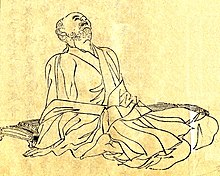Kamo no Chōmei
Kamo no Chōmei ( Japanese 鴨 長 明 , real name: Kamo no Nagaakira , Buddhist name: Ren'in ( 蓮 胤 ); * 1155 ; † July 26, 1216 ) was a Japanese writer.

Life
The son of a Shinto priest at Shimogamo-jinja turned to poetry after the death of his father. He took part in a poetry competition in 1175 and published in 1181 under the title Kamo no Chōmei shū or Kamo no Nagaakira shū ( 鴨 長 明 集 ) a collection of over one hundred poems, one of which was included in the imperial collection of Senzai-wakashū . In the following years he was part of the circle around the poet and priest Shun'e , whose remarks on poetry were later included in his book Mumyōshō ( 無名 抄 ). A work that depicts the history of poetry in Japan and offers anecdotes, particularly about the poetry competitions at the imperial court.
In his thirties, Chōmei retired from public life. He lived in a simple hut according to Buddhist teachings, but still occasionally took part in poetry competitions, and his poems were included in various collections. Around 1200 the Tennō Go-Toba became aware of him. He participated in the compilation of the imperial poetry collection Shinkokin-wakashū and created a post for him that enabled him to retreat to the Ohara Mountains for several years. There he took the Buddhist name Ren'in. After five years he went to Hina and lived there in a hut on Mount Toyoma until his death in 1216.
Chōmei's main work is Hōjōki , in which he describes the decline of the Heian period and his own life as a hermit. Together with the pillow book and the tsurezuregusa, this work is one of the three masterpieces of Zuihitsu literature. Hosshinshū ( 発 心 集 ) is a collection of 102 narratives that illustrate Buddhist teachings. A travel diary from 1186 under the title Iseki ( 伊 勢 記 ) has been lost.
Works
- Kamo no Nagaakira shū ( 鴨 長 明 集 ), collection of 106 poems ( Waka )
- 1211 Mumyōshō ( 無名 抄 , nameless treatise )
- 1212 Hōjōki ( 方丈 記 )
- German notes from my hut , translated by Nicola Liscutin, Insel Verlag , Berlin 2011, ISBN 978-3-458-17527-8
- 1214/15 Hosshinshū ( 発 心 集 , collection of stories on religious awakening )
Web links
Individual evidence
- ↑ 鴨 長 明 . In: デ ジ タ ル 版 日本人 名 大 辞典 + Plus at kotobank.jp. Kodansha, accessed December 7, 2011 (Japanese).
| personal data | |
|---|---|
| SURNAME | Kamo no Chōmei |
| ALTERNATIVE NAMES | 鴨 長 明 (Japanese); Kamo no Nagaakira (real name); Ren'in (Buddhist name); 蓮 胤 (Buddhist name, Japanese); Ren'in (Buddhist name) |
| BRIEF DESCRIPTION | Japanese poet |
| DATE OF BIRTH | 1155 |
| DATE OF DEATH | July 26, 1216 |